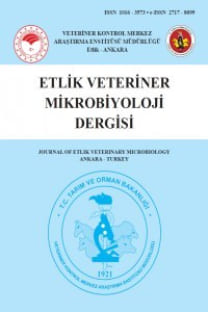Hücre Kültürlerindeki Mycoplsma Kontaminasyonlarının Fluorescense (DAPI) ve Aceto-Orcein Boyama Yöntemleri ile Tespiti Çalışmaları
Hücre Kültürü, Hücre Kültüründe Mycoplsma Kontaminasyonu, Mycoplsma Kontaminasyonu, Floresan DAPI Boyama Yöntemi, Aceto-Orcein Boyama Yöntemi, Mikoplazma Kontaminasyonları, Fluorescense (DAPI) Boyama Yöntemi, 1990, S. İsmet GÜRHAN, Aysun ÖZTÜRKMEN, Etlik Veteriner Mİkrobiyoloji Dergisi
A study on the detectlon of mycoplasma contaminations in cell cultures by using fluorescent DAPI and aceto-orcein staining techniques
___
- CHEN, T.R,, (1977) ·: In situ Detection of Mycoplasma Contamination in Cell Cultures By Fluorecent Hoechst 33258 Stoin. Exp. Cell Res., 104, 25'5-262.
- FOGH. J. and FOGH, .H., (1965) : A Method for Direct Demonstration of PPLO in Cultured Cells. Proc. Soc. Exp. Biol. N.Y. 117, 899-901 .
- Food and Drug Administration, Bethesda MD 20205 Nov. 18: ·1987, «.Points to Cohsider in the Characterization of Cell-Lines· Used to Produce Biologicals. ».
- McGARRITY, G.J., PHILLIPS, D. and VAIDYA, A., (1980) : Detection of M. hyorhinis infection .in Cell Respiratory Gultures. Cytogenet Cell Genet., 27, 194-196. McGARRITY, GJ. STEINER. T. and VANAMAN. V. (1983) : «Use of lndi cator Geli ·Lines ,for Recovery and ldentification of · cell Culture Mycoplasmas; Methods in Myccoplasmology Vol. 2, pp. 167-190; Acad. Press. Inc. N.Y .• London.
- MOWLES; .J.M: (1989) .: The Use of Ciprofloxacin for the Elimination of Mycoplasma from Naturally İnfected Cell-Lines. Accepted for Publication : in Cytotechnology,
- POLAK, A.A, ( 1983) : Detection and Elimination of Mycoplasmas in Cell Cultures. Thesis, RIVM; Nederlands.
- PRECIOUS, B. and R·USSELL, W.C. (1987) ' Growth, Purification and Titrat lion of -Adenoviruses. Virology, a practical approaoh ed. B.W.J. Mahy. IRL Press Ltd. Oxford,Washington D.G.
- ROBINSON, L.B .. WICHELHAUSEN, R:B. and RAZINAN, B., (1956) : Cantamination of Human Cell Cultures by Fleuro-pneumonia Like Organisms. 124, 1147-1150.
- RUSSEL. W.C .. NEWMAN, C. and WILLIAMSON, D.H, (1975) : A Simp'e Cytochemical Technique for Demonstration of DNA . in Cel's lnfected with Mycoplasmas and Viruses. Nature (London) 253, 431-462.
- STRANBRIDGE, E. and SCHNEIDER, E. L. : «The Need for Non Culturcl Methods for the Detection on Mycoplasma Contaminan:s» Joint WHO/IABS Symposium on the Standardization of Cell Substrates for the Production of Virus Vaccines. Geneva. Dec. 1976. Develop. Biol. Standard. Vol. 37, pp. 191- 200. (S. Karger, Basel. 1977).
- World Health Organization Technical Report Series 747, WHO Geneva, 1987. (Acceptability of Cell Substrates for Production of Biologicals>
- ISSN: 1016-3573
- Yayın Aralığı: 2
- Başlangıç: 1960
- Yayıncı: Veteriner Kontrol Merkez Araştırma Enstitüsü Müdürlüğü
Otoimmunite ve Hayvanlardaki Otoimmun Hastalıklar
Koyun Mastitisleri Üzerinde Patolojik ve Bakteriyolojik İncelemeler
Hüdaverdi ERER, Mehmet ATEŞ, Osman KAYA, Metin Münir KIRAN, Şenay BERKİN
Büyük Hacimde Süspanse Hücre Kültürlerinin Stoklanması Üzerinde Uygulamalar
S. İsmet GÜRHAN, Aysun ÖZTÜRKMEN, Tamer ERGÜÇ
Salih YILMAZ, Ziver KARAMAN, Emine GÜLER, Musa YÜRÜSÜN
Samsun Yöresi Sığırlarında Helmintolojik Araştırmalar
Ahmet CELEP, Mustafa AÇICI, Mustafa ÇETİNDAĞ, Şevki Z. COŞKUN, Sait GÜRSOY
Hayvansal Gıdalarda "Organik Fosforlu İnsektisitlerin" Tükenme Süreleri
